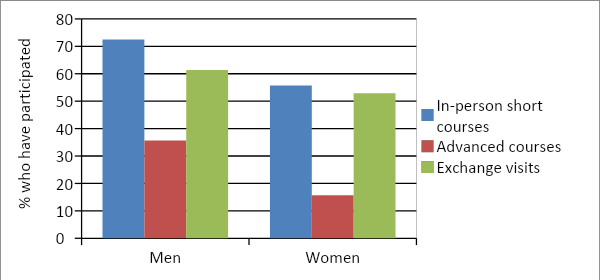The Capacity Gap: Addressing Human Resource Needs in the WASH Sector
Low levels of investment in recruitment, education, and skills development in the water, sanitation, and hygiene (WASH) sector have resulted in significant shortages of skilled professionals needed to sustain WASH interventions and to satisfy the increasing demand for WASH services. This should be of great concern at a time when the global COVID-19 crisis has served as a reminder that the public health and WASH sectors are intricately connected. The crisis has not only placed a spotlight on the necessity of safe WASH conditions in protecting human health but proven that WASH workers, just as much as their health care counterparts, play a critical role in preventing the spread of the virus and reducing its impact. Therefore, the ability of the WASH sector to develop and retain skilled professionals is vital if countries are to make progress in increasing access to water and sanitation and also realize the ripple effect of benefits across the health, education, and economic sectors.
To better understand the capacity gaps and training needs of WASH professionals in sub-Saharan Africa, the USAID–funded Water for Africa through Leadership and Institutional Support (WALIS) project conducted a survey in 2017. Results from the survey revealed that to attract and retain newly qualified and experienced WASH professionals, respectively, and to improve service delivery it is important for countries to invest in the human resource (HR) needs of the WASH sector. This translates into increased HR financing for the capacity-building of staff. Further, the survey found that to meet the current and projected demand for training, it is necessary to go beyond offering formal degree-based education. Short, “just-in-time” training opportunities on specific topics or skills are also recommended.
In 2019 WALIS conducted additional data analysis to identify the needs and preferences of three different target groups that will be important in strengthening the HR capacity of the WASH sector. The key findings from the analysis are summarized in this report.
- Young professionals—as Africa’s population and workforce continue to expand rapidly, this group is vital to the sustainability and growth of the sector. They are critical to maintaining institutional knowledge as they replace retired professionals and developing new technologies and innovations in the sector. Data indicate that they are more likely than their older counterparts to want training in technical skills, such as fecal sludge and wastewater management, in addition to an interest in developing cross-cutting, nontechnical skills. They also prefer mentorship and on-the-job training over short courses as methods of building leadership skills. Finally, young professionals are more likely to stay in the WASH sector because of good training opportunities, so training and mentorship opportunities can be leveraged to attract young talent to sanitation.
- Women professionals—the HR gap in the sector cannot be filled without recruiting more women to the field. While more women are entering the sector, they largely remain an untapped pool of talent accounting for only 20 percent to 30 percent of professionals. Research shows that women already in the sector still face significant barriers in obtaining management-level promotions and other decision-making positions. To help address the barriers women face, it will be important to empower women by offering training opportunities that help them develop the necessary skills to rise to decision-making positions. Gender-targeted training can also help build confidence and provide women with the skills they need to advocate for themselves within their organizations and the wider sector. Women professionals are an untapped market for short courses so they may need to be more specifically targeted through advertising and marketing. Those offering training opportunities should consider how to make training more accessible to women in the sector, including providing funding or discounts, and/or working with employers to ensure that they have access to training opportunities as needed.

- The private sector/independent consultants—the private sector plays an invaluable role in the sanitation value chain, and building the capacity of this group will be critical to achieving universal WASH access. According to the data, this group is less likely to consider their highest formal qualification as having equipped them with the necessary leadership or management skills for their jobs. Therefore, recent graduates or those with only a few years of professional experience would be a prime target market for leadership training, preferably through on-the-job training methods. Courses designed for this group should be offered on weekends or during nonwork hours, as survey results suggest that this group has less schedule flexibility. For training aimed at this group, it may be necessary to work with employers to find times and pricing structures that work. For independent consultants working on their own, it will be vital to effectively communicate the value of paying for training on their own dime.
Research has shown that building the technical skills and competencies of WASH professionals leads to an immediate improvement of WASH project quality and sustainability and will set the WASH sector further along on the path to achieving Sustainable Development Goal 6. Furthermore, if the current COVID-19 climate has taught us anything, it is that strengthening the resident capacity of WASH service providers is not just essential to maintaining communities’ health and stability; it is a matter of urgency.
By Joanne Kihagi, Communications Specialist; Katie Connolly, Program Coordinator, and Alayne Potter, Deputy Chief of Party, for WALIS


